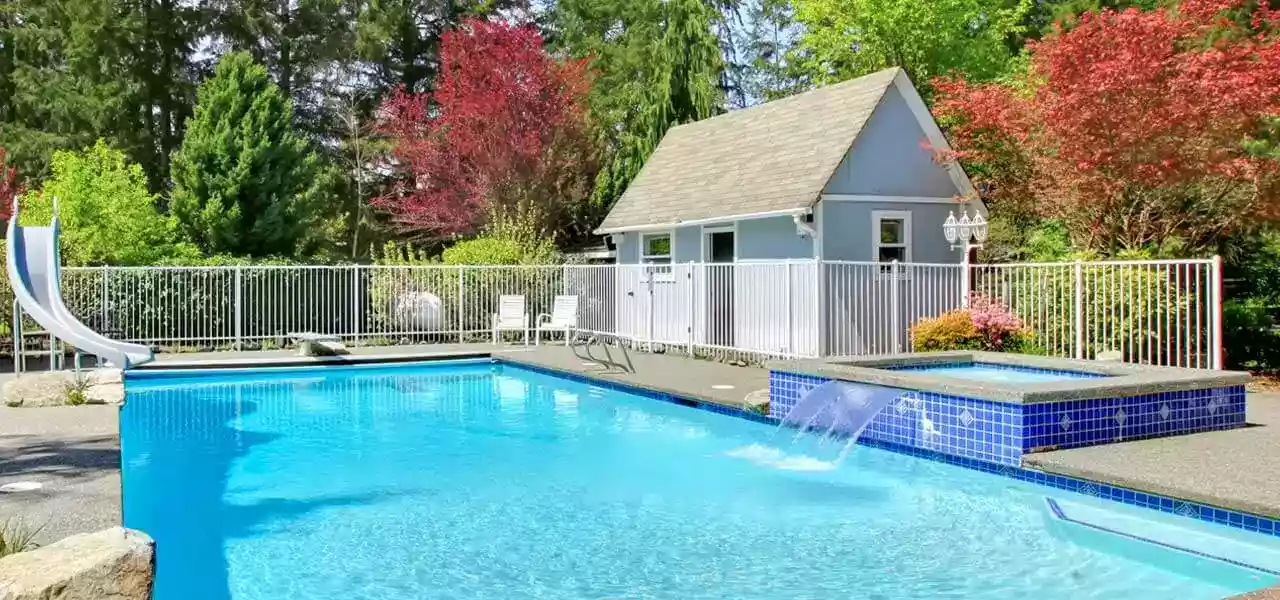10% Off Sitewide Sale + Free Shipping No Minimum*

Pool Equipment Enclosure Ideas
If you've ever wanted to hide your pool pump and filter, this post is for you! A pool equipment enclosure not only keeps your backyard looking tidy, but also protects your costly pool equipment from being damaged by the sun, rain, snow, or anything else Mother Nature has to offer.
While it's not necessary to cover and enclose pool equipment, many pool owners want a way to keep their equipment safe and their backyard pretty. And thankfully, there are endless ways to create a pool equipment enclosure, no matter your taste or budget.
Should You Enclose Your Pool Equipment?
Pool equipment — pumps, filters, pipes, etc. — are designed to be outside and withstand the elements. It's not mandatory to enclose them or cover them, as long as they are safe from severe storms or natural disasters. That being said, they are costly, vital pieces of equipment that last longer with proper care and maintenance.
There are three main types of pool equipment enclosures: walls, boxes, and sheds. Walls are the quickest and easiest way to enclose your pool equipment. While boxes and sheds offer more equipment protection, coverage, and storage space. Let's discuss each option further...

Pool Equipment Enclosures — Walls
The simplest way to hide your pool pump and filter is to put up a small wall or screen to block the view, and the noise from the pump.
If you are handy with wood, you can saw-up your own pool filter screen to hide the pool pump, or you can buy vinyl privacy walls at most home stores and garden centers. As a third option, hire a carpenter to take care of it all for you!
Screens to Hide Pool Equipment
Most privacy screens that you can purchase from a home improvement store are made of vinyl resin. Using pre-fab vinyl fence panels has many advantages:
- Affordability — Most privacy screens have connected stake-like legs on the bottom that secure the screen panels into the ground for stability. Sectional and modular panels are connected with steel bolts, and can be angled into many positions.
- Durability — Vinyl doesn't fade in the sun or rust in the rain. This durability will keep these enclosures looking new for years. When the panels get dirty, simply spray them with a garden hose.
- Variety — There are many types of vinyl screen panels readily available almost everywhere. You can find traditional picket-fence, or prairie-style panels, or go for colors and textures molded to look like real wood panels or bamboo sheets.
Another way to enclose your pool equipment is to make an enclosure yourself! Depending on your abilities, time, and resources, this can be a fun and creative way to give your backyard a unique look and character.
Wood
Whether it's natural wood, stained, painted, or repurposed from another project, wood is an elegant and timeless construction material. It is easy to handle and has great longevity, especially when sealed with a water-resistant sealant.
Concrete
Constructing concrete walls takes some real talent and special tools, but if you know how to create a concrete enclosure, you will have a unique and highly durable enclosure. If you choose concrete, which is porous, remember to use a sealant product.
Stone
This material has incredible variety, from small, round pebbles to long, flat blocks like flag stone, along with different colors, shapes and textures. Like concrete, creating stone walls or enclosures takes an advanced skill set, but results in a natural and classic finished product.
Glass
For ultra-modern homes, glass panels are the ideal material for pool-equipment-hiding enclosures. Depending on your budget, you could surround your entire pool with privacy glass.
Vinyl
Much like the ready-to-assemble vinyl panels you can buy at the big home improvement stores, vinyl is available in board-like planks. Many places also offer vinyl boards made from recycled materials, and with life-like wood grain color and texture.
Pool Equipment Enclosure — Boxes
A box offers more protection from the sun, rain, and other elements for your pool equipment than a walled enclosure. Boxes usually have hinged lids for easy access to your equipment. Obtaining proper equipment size measurements is key to building a quality box. If the box fits too snug around the perimeter of your equipment, there won't be enough room to access the equipment for repairs or maintenance. Always add a few extra inches, or even a foot, to the width, height, and length measurements.

Pool Equipment Enclosures — Sheds
There's one more option for the pool equipment enclosure possibilities — an equipment shed. Sheds fully protect your equipment, while also offering space to store pool toys, supplies, and chemicals.
Whether you build one from blueprints or get a DIY kit, a shed is a great way to conceal your equipment. You can store other items in the shed, including yard tools, pool toys, pool floats, and even smaller pieces of pool furniture.
Pool Equipment Enclosure — Design
- Construct high ceilings and put in windows for proper ventilation.
- Allow enough room for equipment repairs and services. In addition to room for pool supplies, furniture, and maintenance equipment storage.
- Chlorine chemicals, even in tightly sealed buckets, will rust metal on pumps, filters and heaters.
- Heaters or heat pumps cannot be enclosed. Pool heaters need proper air supply and exhaust venting. If enclosed around the sides, be sure the top is open to clear sky, or follow manufacturer instructions for proper venting.
Depending on your budget, the choices of ways to hide your pool equipment is endless. From simple and affordable, to lavish and costly, research and discover what works for you and your yard. Be sure to plant, build, or install something compatible with your regional climate, as well as your style and taste.
We hope you enjoyed this look at pool equipment enclosures. From a simple 2-wall wood enclosure to custom pool cabanas, there are plenty of ways to hide your pool pump!